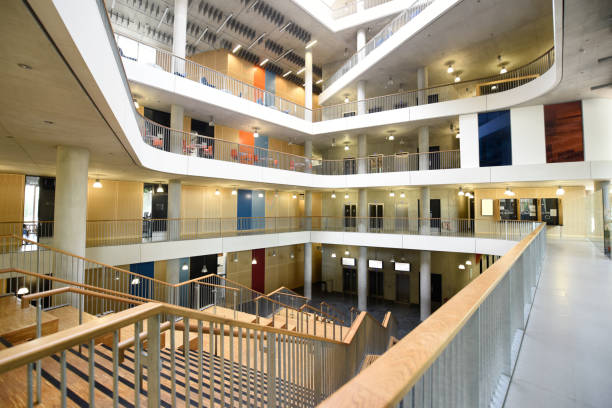Introduction to Designing Safe and Efficient Factory Mezzanine Floor
Designing a safe and efficient factory mezzanine floor requires careful planning, consideration of various factors, and adherence to industry standards. The first step is to assess the specific needs and requirements of the factory space, considering factors such as available floor area, ceiling height, workflow processes, and desired utilisation of the mezzanine floor. Safety is paramount in designing a mezzanine floor, and it should be built to meet building codes and standards relevant to structural integrity, load-bearing capacity, fire safety, emergency escape routes, and employee access. An experienced team of engineers and architects must conduct a comprehensive structural analysis to ensure proper weight distribution on existing columns or supports.
Additionally, incorporating design elements that enhance efficiency is crucial for maximising productivity on the mezzanine floor. This includes thoughtful placement of machinery or workstations for smooth material handling, incorporation of storage systems for inventory management optimisation, proper lighting arrangements for enhanced visibility, and integration of safety features like guardrails or non-slip flooring. A factory mezzanine floor can expand workspace capacity while ensuring worker safety and operational efficiency with meticulous planning, adherence to safety guidelines, and an efficient design approach.
The concept of ergonomics in the manufacturing industry
When designing a factory mezzanine floor, ergonomics is your new best friend. Ergonomics is all about creating a workspace that fits the people using it rather than forcing people to fit the workspace. It’s like a pair of custom-made shoes for your factory floor!
The importance of ergonomic design in factory mezzanine floors
Why is ergonomic design so crucial in a factory setting? Let’s say it’s about more than just comfort and fancy chairs. An ergonomic layout on your mezzanine floor can greatly impact worker productivity and safety. It’s all about creating a space that allows your employees to work efficiently while minimising the risk of musculoskeletal disorders. Trust us: happy employees make for a happy factory!
Understanding the importance of ergonomic layout in a manufacturing setting
The impact of ergonomics on worker health and productivity
Ergonomics isn’t just some fancy buzzword. It’s backed by science! By designing your mezzanine floor with ergonomics, you can significantly reduce the risk of those pesky musculoskeletal disorders that can plague factory workers. Plus, when employees are comfortable and can move freely, their productivity levels shoot through the roof. It’s a win-win situation!
Reducing the risk of musculoskeletal disorders with ergonomic design
Do you know those aches and pains of working in a factory? Well, guess what? They don’t have to be the norm! With ergonomic design, you can minimise the strain on your workers’ bodies and reduce the risk of musculoskeletal disorders. No more “factory back” or “warehouse wrists” – just happy and healthy employees.
Factors to consider when designing an ergonomic layout on a factory mezzanine floor
Analysing workflow and production processes
Before rearranging your mezzanine floor, take a step back and analyse your workflow and production processes. By understanding how your employees move and interact with their environment, you can create a layout that promotes efficiency and minimises unnecessary movement. Think of it like a well-choreographed dance with fewer jazz hands and more forklifts.
Evaluating space limitations and layout constraints
We have limitations as much as we’d love infinite space to play with. When designing your ergonomic layout, consider any space limitations or layout constraints that may exist. It’s like solving a puzzle – finding the perfect balance between functionality and fit. Just think of yourself as the Indiana Jones of mezzanine floor design!
Best practices for optimising workflow and minimising physical strain
Creating efficient and logical work zones
Want to make your employees feel like superheroes? It’s time to create super-efficient work zones on your mezzanine floor. You can minimise unnecessary movement and maximise productivity by logically organising your tools and equipment. Think of it as giving your employees their very own Batcave – with everything they need at their fingertips.
Maintaining proper clearances and pathways
Nobody likes playing a game of workplace obstacle course, especially when the stakes are high (like, you know, avoiding crashing into equipment). So, when designing your ergonomic layout, maintain proper clearances and pathways. Give your employees the gift of smooth sailing, plenty of room to maneuver and minimal risk of accidental collisions. It’s like creating the Autobahn of factory floors!
Promoting good posture and body mechanics
Remember all those times your mom told you to sit up straight? Well, she was onto something. When designing your ergonomic layout, consider promoting good posture and body mechanics. Consider adjustable workstations and supportive seating to help employees maintain proper alignment and avoid unnecessary strain. It’s like giving a gentle nudge to your employees’ spines, reminding them to stand tall and proud.
With these tips for designing an ergonomic layout on your factory mezzanine floor, you’ll be well on your way to a happier and healthier workforce. So, embrace the power of ergonomics and create a functional space and a joy to work in. After all, who said factory floors couldn’t have a little flair?
5. Selecting and arranging ergonomic equipment and workstations on a mezzanine floor
Choosing ergonomic workstations and furniture
Choosing workstations and furniture that prioritise comfort and support is important when designing an ergonomic layout on a mezzanine floor. Look for adjustable chairs and desks that accommodate different heights and body types. Don’t be afraid to splurge on ergonomic chairs that offer proper lumbar support – your employees’ backs will thank you.
Optimising equipment placement for easy access
People prefer to play an intense game of hide-and-seek with their tools and equipment. Ensure everything is within easy reach on the mezzanine floor by organising and arranging equipment thoughtfully. Keep frequently used items nearby and accessible, while lesser-used ones can be stored further away. This way, your employees won’t have to stretch and strain to reach their needs, saving them from unnecessary discomfort.
Implementing proper lighting, ventilation, and safety measures for enhanced ergonomics
Ensuring adequate lighting for visual comfort
No one wants to work in a dimly lit factory that feels like a cave. Good lighting is important for productivity, reducing eyestrain, and preventing accidents. Ensure sufficient and evenly distributed lighting on the mezzanine floor so your employees can see what they’re doing and avoid unwanted surprises.
Providing proper ventilation and temperature control
If your factory mezzanine floor feels like a sauna on a hot summer day or a freezer in winter, you’ve got a problem. Adequate ventilation and temperature control create a comfortable and safe working environment. Install fans, air conditioning, or heating systems to maintain optimal temperature and airflow. Your employees will appreciate not feeling like they’re roasting or freezing while trying to do their job.
Enhancing safety with non-slip flooring and signage
There’s nothing like a slick floor to add excitement to a factory, but we can all agree it’s not the kind of excitement we want. Keep your employees safe by investing in non-slip flooring materials and marking walkways and hazardous areas with signs. After all, your employees have enough to worry about without the added thrill of unexpected slips and falls.
Training and educating employees on ergonomic practices and techniques
Providing ergonomic training programs for employees
Even with the most ergonomic layout and equipment in place, it will only make a difference if your employees know how to use them properly. Offer training programs that educate your staff on ergonomic practices and techniques. Teach them about proper posture, lifting techniques, and the importance of taking regular breaks. It’s like giving them the keys to unlocking a world of comfort and well-being.
Encouraging regular breaks and stretching exercises
Sitting or standing in one position for extended periods can wreak havoc on the body. Encourage your employees to take regular breaks and engage in stretching exercises to alleviate muscle tension and improve circulation. Not only will it benefit their physical well-being, but it can also serve as a mental refresher, leading to increased productivity. Don’t be surprised if you see employees doing impromptu yoga moves on their break – they’re taking care of their ergonomic needs.
Monitoring and continuously improving ergonomic design on factory mezzanine floors
Evaluating the effectiveness of ergonomic design
Designing an ergonomic layout is not a one-and-done deal. It’s important to evaluate your design’s effectiveness to identify improvement areas regularly. Monitor employee feedback, observe their working habits, and assess any issues or complaints. This way, you can make necessary adjustments and keep your mezzanine floor up to par with the ever-changing ergonomic needs.
Collecting feedback and addressing concerns
Remember, your employees are your best resource for understanding how well your ergonomic design is working. Actively seek their feedback and encourage them to share any concerns or suggestions. Creating an open dialogue will make your employees feel heard and valued and enable you to address any issues promptly. It’s like a win-win situation for everyone involved – except for discomfort and inefficiency, they don’t stand a chance. In conclusion, designing an ergonomic layout on a factory mezzanine floor is crucial for promoting worker health, safety, and productivity. By considering factors such as workflow, space limitations, and equipment selection, manufacturers can create an optimised work environment that reduces physical strain and minimises the risk of injuries. Proper lighting, ventilation, and safety measures enhance the ergonomic design. Additionally, training employees on ergonomic practices and continuously monitoring and improving the layout ensures long-term success. Manufacturers can create a sustainable and efficient workplace that prioritises ergonomics and benefits employees and the facility’s overall productivity.
FAQs
1. Why is ergonomic design important for factory mezzanine floors?
Ergonomic design is important for factory mezzanine floors because it helps to create a safer and healthier work environment for employees. It minimises physical strain and reduces the risk of musculoskeletal disorders, improving productivity and reducing absenteeism.
2. What factors should be considered when designing an ergonomic layout on a factory mezzanine floor?
Workflow analysis, floor space limitations, clearances, and proper equipment placement should be considered when designing an ergonomic layout on a factory mezzanine floor. Ensuring that workstations are logically organised, clear pathways are maintained, and employees have easy access to ergonomic equipment and tools is important.
3. How can I promote ergonomic practices and techniques among employees?
Promoting ergonomic practices and techniques among employees can be achieved by providing proper training programs that educate them on the importance of good posture, body mechanics, and regular breaks. Encouraging stretching exercises and creating a culture that values and prioritises ergonomics can also help promote its adoption.
Autobiography
Eric Reyes is a passionate thought leader, having been featured in 50 distinguished online and offline platforms. His passion and knowledge in Finance and Business made him a sought-after contributor, providing valuable insights to his readers. You can find him reading a book and discussing current events in his spare time.











